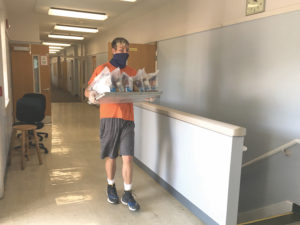After a kitchen worker tested positive for Covid-19 on Friday, the region’s entire federally supported free lunch program, which spans Harwich to Provincetown, was shut down on Monday. Thirteen staffers were tested for the virus, and one additional positive was found.

The scenario that played out at the Food 4 Kids program is a window into what could happen if schools reopen and someone in a building tests positive.
“I’m sure all the principals are watching this,” said Brenda Ridgeway, co-director of Food 4 Kids, a program that distributes 600 free meals a day to children in the Monomoy, Nauset, Truro, and Provincetown school districts.
On Sunday, Ridgeway was notified that a kitchen employee who prepares the meals at Nauset Regional Middle School tested positive in a routine Covid-19 screening prior to undergoing a medical procedure. She was asymptomatic, Ridgeway said.
Everyone who worked directly with her in the kitchen, plus two people who help pack the meals with her a couple of times a week, were all ordered to get tested, and their results had to come back negative before they could return to work, Ridgeway said.
Since it takes up to a week to get results from the more accurate (and insurance-covered) molecular test like the one offered by Outer Cape Health Services, employees used a rapid test available on Cape Cod at Carewell Urgent Care in Dennis. These tests are highly accurate in detecting positives, but negative results should still be followed up by a molecular exam, according to the FDA.
Harry Galloway-Kahn, who spends summers in Wellfleet, has been distributing about 130 bagged lunches a week from the Wellfleet Elementary School. He was one of the two staff members who helped the infected kitchen employee directly. His family paid $160 for the Carewell rapid test. Ridgeway said all employees will be reimbursed for the test, and for their time waiting in line.
Galloway-Kahn tested negative and was back at work on Tuesday morning. So were all but one of the other kitchen employees, who had been asymptomatic but tested positive, Ridgeway said.
In terms of reducing both spread and disruption, Ridgeway said it turned out to be helpful that the Food 4 Kids lunch preparation and distribution system had been set up to keep people in the kitchen isolated from others as much as possible. If a Covid-positive person is detected inside a school, Ridgeway now wonders, will the principals shut down a classroom, or just a certain part of the school?
In other years, Food 4 Kids has been operated by the Church of the Holy Spirit in Orleans. The church receives most of the funding for the program from the federal government, with donations making up the rest of the $100,000 annual budget.
This year, however, because the school cafeteria staff had been making lunches for kids to be delivered daily since schools closed in March, program planners arranged for Nauset school cafeteria staff to prepare the meals, which are then distributed by the Food 4 Kids staff, Ridgeway explained. The federal money goes to the schools instead of the church.
Ordinarily the food is given out to recreation camp programs; but this year, it’s simply distributed at schools daily, or in the case of Truro, at the community center by the library.
About 600 children are signed up for the meals this year, about 100 more than the usual number, she added.



